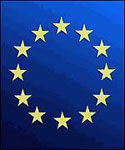 Reuters: Parts of Iran’s oil and gas industry could be targeted by an extra layer of European Union sanctions, according to a document prepared for EU leaders.
Reuters: Parts of Iran’s oil and gas industry could be targeted by an extra layer of European Union sanctions, according to a document prepared for EU leaders.
By Luke Baker
 BRUSSELS, June 11 (Reuters) – Parts of Iran’s oil and gas industry could be targeted by an extra layer of European Union sanctions, according to a document prepared for EU leaders.
BRUSSELS, June 11 (Reuters) – Parts of Iran’s oil and gas industry could be targeted by an extra layer of European Union sanctions, according to a document prepared for EU leaders.
The measures would not restrict Iranian oil and gas exports or imports but would seek to shut off new investment in the industry, as well as the transfer of technology, equipment and services to a sector that is economically vital to Iran.
Iran is the world’s fifth largest crude oil exporter.
The EU restrictions, which would go substantially beyond the sanctions agreed by the United Nations Security Council this week, are contained in a draft declaration prepared for a summit of EU heads of state and government in Brussels on June 17.
The declaration expresses “deep regret that Iran has not taken the many opportunities” to assuage international concerns about its nuclear programme, particularly given its decision to enrich uranium to levels that bring it closer to weapons-grade.
“Under these circumstances, new restrictive measures have become inevitable,” says the draft obtained by Reuters, which could be subject to change before it is issued.
It says the measures should focus on trade, especially dual-use goods, and further restrictions on trade insurance and Iran’s financial sector, including freezing additional Iranian banks and insurance firms.
“The transport sector, in particular the Islamic Republic of Iran Shipping Line (IRISL) and air cargo; key sectors of the gas and oil industry with prohibition of new investment, transfers of technologies, equipment and services; and new visa bans and asset freezes, especially on the IRGC (Islamic Revolutionary Guard Corps),” the draft statement says.
The declaration, if issued in its current form, would go further than some EU states, including Spain and Cyprus, had indicated they would be willing to go. Germany was also seen as reluctant to target anything in Iran’s oil and gas sector.
SANCTIONS AND TALKS?
The move coincides with efforts by the U.S. Congress to draw up additional measures against Iran.
It is designed to put extra pressure on Tehran to return to negotiations over its uranium enrichment programme, which the West believes is aimed at developing nuclear weapons but Iran says is purely for peaceful purposes.
The measures are also designed to add bite to Wednesday’s U.N. sanctions package, parts of which were watered down by Russian and Chinese opposition. The impact of the package was also weakened by Turkish and Brazilian votes against it.
If the declaration is approved, EU leaders will ask their foreign ministers to move ahead with implementing the extra restrictions at a meeting in July.
The rapid push for tighter measures on Iran is part of an EU-US effort to bring Iran back to the negotiating table. It is accompanied by statements saying the EU and the United States are ready to talk to Iran.
Catherine Ashton, the EU’s high representative for foreign affairs, has the backing of the United States, France, Germany, Britain, Russia and China — the six powers behind the U.N. sanctions package — to try to reengage with Iran’s leaders.
She has said repeatedly she would be willing to meet Iran’s chief nuclear negotiator, Saeed Jalili, at any time, as long as the nuclear programme is on the agenda and the discussions do not obstruct the U.N. sanctions process.
Iran has described the U.N. sanctions as a “used handkerchief” and said they will not halt its uranium enrichment work. Turkey and Brazil, which have negotiated with Iran in recent months, also dismissed the sanctions as a mistake.
For more on Iran’s plans, double-click on
(Reporting by Luke Baker; editing by Noah Barkin)


